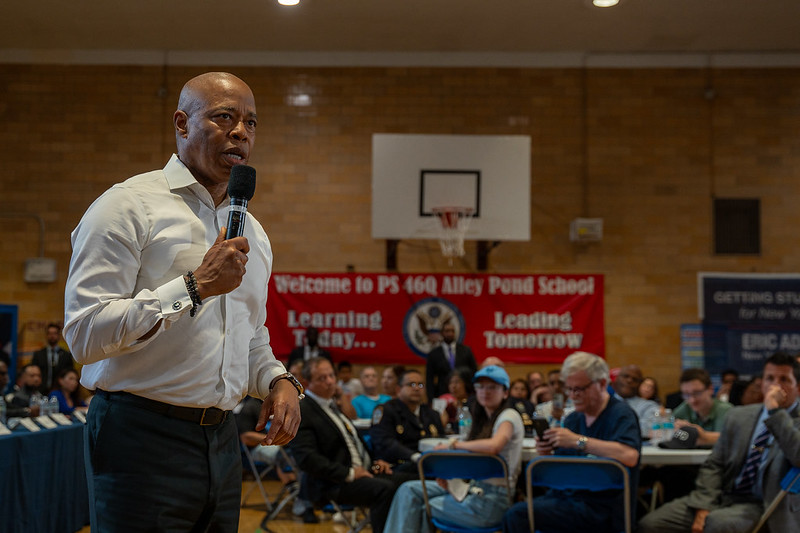The final month of the state legislative session is a dark circus in the best of times. And these are not the best of times.
Two of the three men in the room are gone. Former Assembly Speaker Sheldon Silver and former Senate Majority Leader Dean Skelos stepped down from their posts in the wake of corruption charges filed by U.S. Attorney Preet Bharara a Silver in January, Skelos just days ago. And the third man is understandably distracted. Gov. Andrew M. Cuomo will be away from Albany for periods of time supporting his companion, Sandra Lee, who is scheduled to undergo a double mastectomy in her battle against breast cancer.
Now leading the legislature are two veteran lawmakers who are less experienced at leadership and especially negotiation, the key skill needed at this time of year a Assemb. Carl Heastie, a Bronx Democrat, and Sen. John Flanagan, a Republican from East Northport. And legislators are operating in an atmosphere of anxiety about when the next subpoena will drop a so much so that many of their colleagues are pushing to do only what must be done so they can get out of Albany as fast as possible. The session ends June 17, and rarely has an end date seemed so terminal.
So, what’s going to happen? Sadly, it may be not as much as we’d like. Good bills will fall by the wayside because itas easier to let them go. Deals will be made, of course, but which bills are paired with each other and traded off in this chess match remains to be seen.
There’s a lot to do. Many issues that were to be hashed out in March’s budget negotiations proved too thorny and were dropped into this final session. Four important laws are about to expire and must be renewed in some form a mayoral control of schools in New York City, rent control for the city and a handful of municipalities in Nassau County, the 421-a tax credit for luxury condo developers in New York City, and the state property tax cap (see below).
One important piece of the ethics legislation passed during the budget process – a measure under which convicted public officials would lose their pensions – turns out not to have been approved yet by the Assembly. And the endless war over how best to evaluate teachers rages on, with more legislative tweaks to consider.
The session is also a chance for Flanagan to show he was serious when he said upon assuming his new post that he will promote transparency and work to restore people’s faith in government. He can start with a simple gesture: Allow votes on bills that have more sponsors than are needed for passage.
Typically, such legislation, often enjoying bipartisan support, has been bottled up when a vote would force Republican senators to take a public stand on a controversial issue. One notable exception: Skelos allowing a vote on legalizing same-sex marriage, which passed.
Flanagan can take a powerful stand by letting his members consider a bill that would ban the sale of children’s products made with arsenic, mercury, lead and other toxic chemicals; another that would ban microbeads from personal care products; and a third that would essentially stop fracking waste created in other states from being dumped in New York. Each bill has at least 32 sponsors, the number needed for passage in the 63-member Senate. He also should let come to the floor legislation that would bar discrimination against transgender people.
In short, it’s a long to-do list. Flanagan, Heastie and their comrades need to stay focused, keep their eyes on their work not the calendar, and make good on their promises to provide a new level of leadership.
The legislative clock is ticking in Albany. Here’s what we’d like to see get done:
— Ethics. Put a constitutional amendment on the ballot to let voters decide whether to strip pensions from convicted public officials. It was passed by the Senate. It has stalled in the Assembly over concerns by public sector unions that this could be the start of a slippery slope to more changes to pension benefits. Pass it.
— Parental Choice in Education Act. Gov. Andrew M. Cuomo’s bill offers tax credits for low-income families who send children to nonpublic schools and for contributions to scholarship funds for low- and middle-income students at nonpublic schools or public schools outside their districts. Public education is our nation’s cornerstone, and we’d prefer to have highly effective public schools so families would not have to seek out alternatives. But we’ve seen too many poor kids denied a good education because of their economic status or where they live. Teachers would also get a $200 tax credit for supplies they purchase out of their own pockets. Pass it.
— Teacher evaluations. The portion of Sen. John Flanagan’s bill that would delay implementation of the new evaluation system for one month to give school districts more time to draw up plans is a sensible compromise. Pass it.
— Rent control-property tax cap. Rent control in New York City and a few places in Nassau County expires in June; the state tax cap sunsets next year. Extend both.
— 421-a. The tax credit for luxury developers, which expires in June, figured in charges against Assemb. Sheldon Silver and Sen. Dean Skelos. It has spurred construction, but has fallen short in its goal of creating affordable housing. Fix it before it’s extended.
— Mayoral control of New York City schools. This, too, is expiring. Done for former Mayor Michael Bloomberg, it also should be given to Mayor Bill de Blasio, but with a three-year renewal date.
— Charter school cap. Raise it. Charters have been lifesavers for many kids, but there are only 25 slots left for new schools in New York City, for example.
— Environment. Approve a ban on the sale of children’s products made with toxic chemicals, and one to eliminate microbeads in personal care products.
— School finances. Mandate votes on school bonds be held the same day in May as school budget votes.
— Sexual assault. Pass a bill to help prevent and respond to sexual assaults on college campuses.
— Criminal justice. Raise the age of criminal adult responsibility from 16 to 18.
— Public information. Speed the appeals process when an agency denies a freedom-of-information request.




































